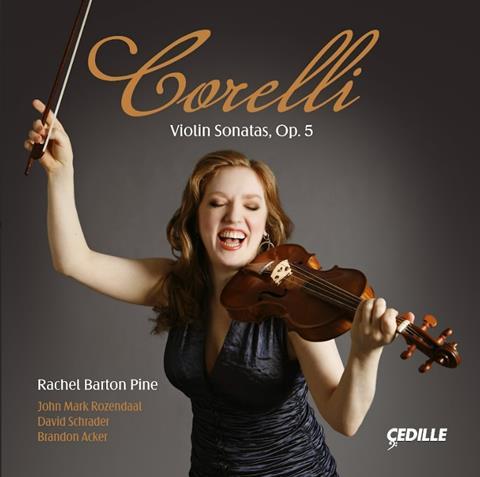Rachel Barton Pine’s new album of Arcangelo Corelli’s Op. 5 violin sonatas, on which she is joined by period-instrument specialists David Schrader (keyboards), John Mark Rozendaal (cello) and Brandon Acker (guitar), reflects the experimental spirit of Corelli’s original scores.

On her latest release, Rachel Barton Pine turns her attention to the Italian baroque and historically informed performance. The two-disc album, her 24th on the Cedille Records label, presents all 12 violin sonatas comprising Arcangelo Corelli’s Op. 5 collection from 1700. Joining Barton are the three period-instrument specialists David Schrader (keyboards), John Mark Rozendaal (cello) and Brandon Acker (guitar).
The remarkably versatile violinist is known for her devotion to a vast spectrum of musical passions, from classical-heavy metal confluences (Dependent Rising, her previous release) and Scottish fiddle traditions to her advocacy of music by Black composers.
Pine’s new Corelli album marks a return to early music, which has been an important focus throughout her career. The first American (and youngest winner) to receive the Gold Medal at the J.S. Bach International Violin Competition in Leipzig in 1992, Pine released a widely acclaimed interpretation of Bach’s sonatas and partitias for solo violin in 2016 that was accompanied by a new Urtext edition with her historical notes and performance suggestions.
With her musical partners, Pine reflects the experimental spirit of Corelli’s original scores. Schrader alternates between organ and harpsichord, as does Rozendaal between violoncello and viola da gamba, while Acker performs on theorbo, archlute and baroque guitar. Pine performs the ‘Follia’ variations (Sonata No. 12) on an original-condition Gagliano viola d’amore, exploring this rarely used instrument in an authentic historical context.
Pine also improvised all her ornaments. ‘At the urging of my daughter, who is deeply immersed in composition studies, I challenged myself to play a little differently on each take,’ she writes. ‘Rather than worrying about making sure that I always played the “best possible” ornament or trying to remember something nice that I had just done and replicating it, I let spontaneous inspiration flow. I forced myself to trust that my instincts and the producer’s wisdom would yield a good result. It was rather magical not to know exactly which notes I was going to play until they were appearing!’
Stay tuned for our in-depth cover interview with Rachel Barton Pine, who celebrates her 50th birthday next month, in the November 2024 issue of The Strad.
Read: Joshua Bell and Steven Isserlis on their passion for Mendelssohn
Read: Julia Hagen makes her Vienna Philharmonic debut at the Lucerne Festival
The number one source for playing and teaching books, guides, CDs, calendars and back issues of the magazine.
In The Best of Technique you’ll discover the top playing tips of the world’s leading string players and teachers. It’s packed full of exercises for students, plus examples from the standard repertoire to show you how to integrate the technique into your playing.
The Strad’s Masterclass series brings together the finest string players with some of the greatest string works ever written. Always one of our most popular sections, Masterclass has been an invaluable aid to aspiring soloists, chamber musicians and string teachers since the 1990s.
The Canada Council of the Arts’ Musical Instrument Bank is 40 years old in 2025. This year’s calendar celebrates some its treasures, including four instruments by Antonio Stradivari and priceless works by Montagnana, Gagliano, Pressenda and David Tecchler.













































No comments yet